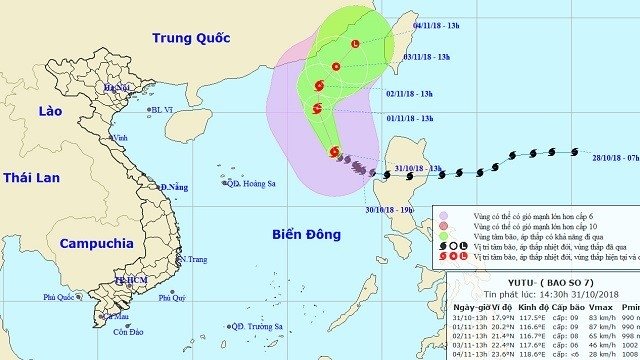
Storm Yutu has weakened as it entered the East Sea on the morning of October 31, according to the National Centre for Hydro-Meteorological Forecasting.

The projected location and movement of Storm Yutu. (Photo: nchmf.gov.vn)
Earlier on Tuesday afternoon, the storm crossed the Philippine island of Luzon
to enter the waters of the East Sea, becoming the seventh storm to hit the East Sea
this year.
As of 1 pm Wednesday afternoon, its
centre was located roughly 560
km northeast of Vietnam’s Hoang Sa (Paracel)
archipelago, packing winds of up to 75-90 km/h.
In the next 24 hours, the typhoon will
move north-westward at a speed of 10km per hour. By 1 pm on November 1, the
hurricane’s location is expected to be approximately 570 km northeast of Hoang Sa
archipelago, with the strongest wind near its eye at 75-90 km/h.
In the next 24-48 hours, Yutu will move
northward, travelling at 5-10km per hour. By 1 pm on November 2, its center is
forecast around 440 km
southwest of Taiwan (China), with
the strongest wind from 60-75
km/h.
In the next 48-72 hours, the storm will
move north-eastward at a speed of 5-10 km per hour, weakening into a tropical
depression. By 1 pm on November 3, the tropical low pressure is expected to be
roughly 270 km
southwest of Taiwan (China). The
strongest wind near the centre of the tropical low pressure is forecast to be
from 40-50 km/h.
Due to the influence of a current cold
spell strengthening from the north, combined with the storm’s circulation,
strong winds and rough seas are forecast for the Gulf of Tonkin
from tonight.
To actively respond to Yutu, on late
October 30, the Central Steering Committee for Disaster Prevention and Control
issued Notice No. 538/TWPCTT-VP to its member units and coastal localities from
Quang Ninh to Khanh Hoa, as well as the relevant central and local agencies, urging
for close monitoring of the storm, while informing means and vessels operating
on the sea on the position and direction of the storm to take responsive
measures. They were also asked to prepare forces and means for search and
rescue upon request.
Also on late Tuesday, the Border Guard Command
of the central province
of Thanh Hoa announced
that the unit has cooperated with the authorities of relevant coastal
localities to call on 4,992 vehicles with 20,686 workers on board to seek safe
anchorage.
Source: NDO
More than just an information technology teacher, Bui Van Nien is an inspiring figure who has nurtured the scientific curiosity and creative spirit of students in Vietnam’s ethnic minority communities.
Da Bac is the most disadvantaged mountainous district in Hoa Binh province, with ethnic minorities accounting for about 90% of its population. Over the past years, the district has mobilised resources to implement ethnic policies to improve the quality of life of local people.
In recent years, Hoa Binh province has consistently prioritised the protection, care, and education of children, particularly those from ethnic minorities and disadvantaged backgrounds, by creating a safe, healthy, and nurturing environment for their all-round development.
The Steering Committee for Tobacco Harm Prevention and Control of Hoa Binh province, in coordination with the Tobacco Harm Prevention and Control Fund, held a ceremony on May 28 in response to the World No Tobacco Day (May 31) and the National No Tobacco Week (from May 25 to 31). The event was chaired by Nguyen Van Toan, Standing Vice Chairman of the provincial People’s Committee and head of the Steering Committee.
Since 2021, the Center for Industrial Promotion and Industrial Development Consulting (CIIDC) under the Department of Industry and Trade has been implementing a school lighting model as part of the plan for using energy efficiently and economically in Hoa Binh Province in the pẻiod of 2021 - 2025. This model not only aims to improve the learning conditions and enhance the education quality, but it also promotes the message of energy saving, energy security, environmental protection and contributes to the goals of socio-economic development.
In the 2024 - 2025 school year, the entire Hoa Binh provincial education sector includes 520 educational institutions and schools. Among them are 13 ethnic boarding schools with 153 classes and 4,487 students. Four of these schools have met national standards, reaching 30.7 percent.



